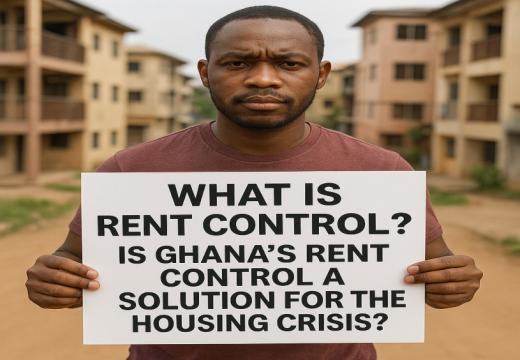What Is Rent Control? Is Ghana's Rent Control a Solution For the Housing Crisis?
What Is Rent Control? Is Ghana's Rent Control a Solution For the Housing Crisis?
- by PropHunt Admin
- On 25-04-2025
- at 11:51 AM

With rental housing in Ghana continuing to be unaffordable for so many tenants, a lot of discussions are questioning whether the rent control policy option in Ghana is really a solution to Ghana's rental housing crisis. In most developed countries, rent control is designed to help keep housing more affordable in high-demand areas. Usually, the idea is to limit the amount of rent charges and rent increases by landlords in a year.
The rent control in Ghana for a very long time has failed to control the rental market that it was set out to achieve. The habit of landlords fixing and increasing rents annually without any form of assessment has become a norm in the Ghanaian real estate market. Whether you're a tenant or a property owner, it's important to understand the details of rent control in Ghana.
Read on as we discuss more about Ghana rent control: what it is, how it works, and how you can ensure you're set up for rental success.
What is Rent Control
Rent control is a deliberate government policy that limits how much a landlord can charge for leasing a home or how much they can increase rent over time. Ghana Rent Control is regulated by the Rent Act of 1963 (Act 220). The idea of this act was intended to protect tenants from excessive rent increases and to ensure affordable housing options, especially in areas of high demand.
The Rent Control Department in Ghana is responsible for rental regulations, mediation of disputes between landlords and tenants, and ensuring that eviction procedures adhere to the law. Ghana's rent control laws can benefit tenants by preventing excessive rent increases, which potentially limits tenants from having to move away from local communities.
Rent control laws vary by country and city, with some policies capping rent increases at a fixed percentage annually and others restricting the circumstances under which a tenant can be evicted. While rent control can help tenants afford housing in the short term, it has also been criticized for discouraging investment in rental properties and reducing housing supply.
The Ghana Rent Control policies can take various forms, including
-
Rent freezes: This policy prohibits landlords from increasing rent for a specific period.
-
Rent stabilization: This policy allows for rent increases but limits them to a certain percentage or ties them to an index, such as the Consumer Price Index (CPI).
-
Vacancy control: This policy limits rent increases when a tenant moves out, preventing landlords from charging significantly higher rent to new tenants.
How Does Rent Control Work in Ghana?
Let's look a bit closer at how rent control in Ghana works in practice. In advanced countries like the US, rent control policies typically set maximum rent limits, restrict rent increases to a certain percentage per year, and establish rules for evictions. However, in Ghana, the Rent Act establishes the Rent Control Department (RCD). The Rent Act basically consolidates and amends the law relating to the control of rents and the recovery of possession of premises in certain cases.
The Rent Control Department (RCD) is responsible for regulating landlord-tenant relationships under the Rent Act of 1963 (Act 220). The department oversees rental agreements, mediates disputes, and enforces regulations to protect both landlords and tenants. One of the major provisions of the law is the restriction on excessive rent advances, which are meant to be capped at six months.
However, enforcement of this rule has been weak, leading to widespread non-compliance by landlords in Ghana.
Is Rent Control a Solution in Ghana?
While rent control can help protect tenants from excessive rent hikes and unfair evictions, the experience of practicing it over the longer period and, more so, international evidence suggest, however, that rent control on its own cannot bring rental affordability. To achieve rental affordability, it must go hand in hand with additional social housing and further measures to address housing affordability.
The solution to rental affordability in Ghana should not only focus on rent control because its effectiveness in addressing Ghana's housing crisis is questionable due to the following reasons:
Poor Enforcement—Despite legal restrictions, Ghanaian landlords often demand excessive rent advances with little consequence. The lack of strict enforcement by the rent control department undermines the purpose of the rent control system.
Housing Supply Constraints—The country is already in a pool of housing deficit of about 1.8 million units. If rent control policies are too restrictive, they may discourage real estate developers and landlords from investing in rental properties in Accra, worsening the housing shortage in the long run.
Informal Rental Market—Many rental agreements in Ghana are made informally, without legal documentation, making it difficult for authorities to regulate and enforce rent control measures.
Inadequate Affordable Housing Initiatives—Rent control alone does not increase the supply of affordable housing. Without significant investment in affordable housing projects, rent control policies may only provide temporary relief without addressing the root cause of the housing crisis.
Functions of the Rent Control Department in Ghana
Here's a more detailed breakdown of the functions of the Rent Control Department in Ghana:
Implement and Enforce the Rent Control Act
The rent control department in Ghana plays a crucial role in implementing and enforcing the Rent Control Act, which sets the framework for tenancy and rent-related matters. Their sole mandate is to regulate rent-related activities in the Ghanaian real estate market.
Dispute Resolution
Another important mandate of Rent Control Ghana is to provide a platform for tenants and landlords to resolve disputes related to rent, evictions, and other tenancy-related issues.
Smooth Mediation
The department mediates disputes between landlords and tenants, aiming to find amicable resolutions. The Rent Control Department works tirelessly in cases of dispute in order to bring about an agreement or reconciliation between tenants and landlords in Ghana.
Promote Legal Procedures
Tenants who believe they are being unfairly evicted or have other tenancy-related concerns can seek assistance from the Rent Control Department. They also ensure that eviction procedures adhere to the law, protecting tenants from arbitrary evictions.
Promoting Peaceful Coexistence:
Finally, the Rent Control Department aims to foster peaceful coexistence between landlords and tenants, ensuring that every Ghanaian has access to safe, adequate, and affordable housing.
Conclusion
Ghana’s rent control system, in its current state, is not a comprehensive solution to the housing crisis. While it offers some protection to tenants, its weak enforcement, combined with a lack of affordable housing, limits its effectiveness. A holistic approach that includes improved enforcement, increased housing supply, and financial incentives for landlords and developers is necessary to address Ghana’s housing challenges in a sustainable way.

 French
French




